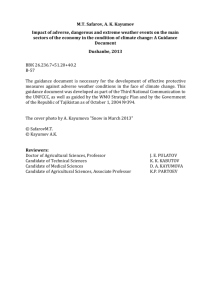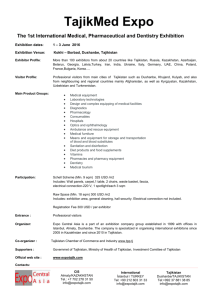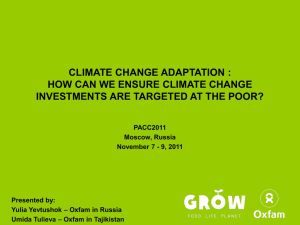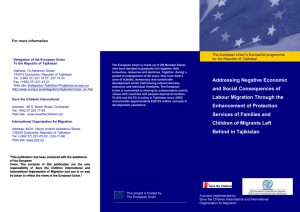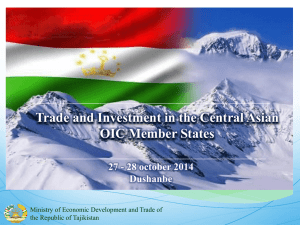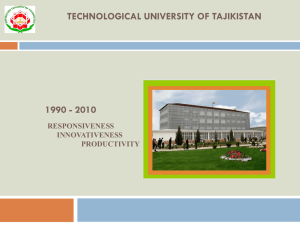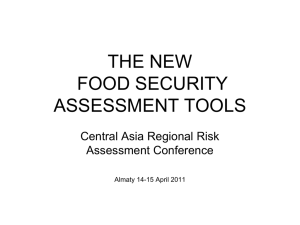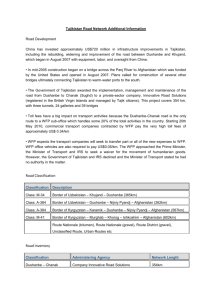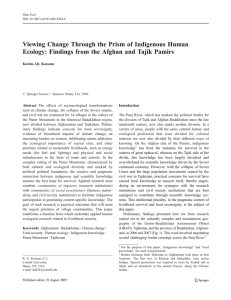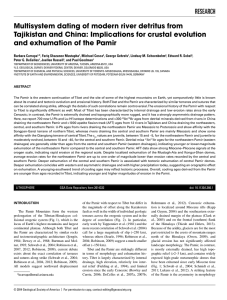Final Report - The Rufford Foundation
advertisement
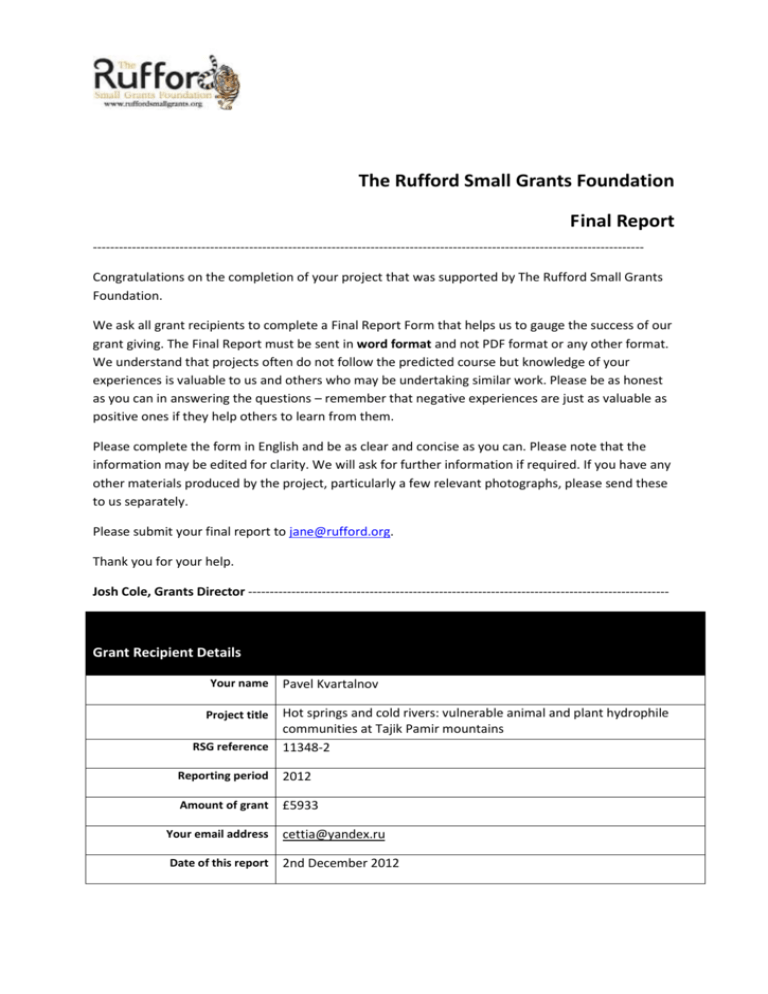
The Rufford Small Grants Foundation Final Report ------------------------------------------------------------------------------------------------------------------------------Congratulations on the completion of your project that was supported by The Rufford Small Grants Foundation. We ask all grant recipients to complete a Final Report Form that helps us to gauge the success of our grant giving. The Final Report must be sent in word format and not PDF format or any other format. We understand that projects often do not follow the predicted course but knowledge of your experiences is valuable to us and others who may be undertaking similar work. Please be as honest as you can in answering the questions – remember that negative experiences are just as valuable as positive ones if they help others to learn from them. Please complete the form in English and be as clear and concise as you can. Please note that the information may be edited for clarity. We will ask for further information if required. If you have any other materials produced by the project, particularly a few relevant photographs, please send these to us separately. Please submit your final report to jane@rufford.org. Thank you for your help. Josh Cole, Grants Director ------------------------------------------------------------------------------------------------- Grant Recipient Details Your name Pavel Kvartalnov Hot springs and cold rivers: vulnerable animal and plant hydrophile communities at Tajik Pamir mountains RSG reference 11348-2 Project title Reporting period 2012 Amount of grant £5933 Your email address cettia@yandex.ru Date of this report 2nd December 2012 1. Please indicate the level of achievement of the project’s original objectives and include any relevant comments on factors affecting this. Objective Study of bird Not achieved Partially achieved Fully achieved Comments + We carried out stationary research in diversity and Varzob valley (Kondara Biological distribution Station, Gissar range) from 17th to 28th May and in Ghund valley (Dehmiyona village, Pamir Mountains) from 23rd May to 23rd July. We also inspected vicinities of Dushanbe city, Ghund river valley (along the Main Pamir road), vicinities of Alichur and Murghab settlements (Pamir Mountains), Panj River valley (from Khorog to Langar), lower Pamir River valley, Zor Kul (Victoria) Lake and some other places in Pamir mountains and Gissar range. We observed about 160 bird species and specified their distribution and numbers. We found new possible breeding bird species for Tajikistan (Turdus unicolor) and collected first data about breeding of Rhyacornis fuliginosus in the country. Study of breeding + We studied breeding biology and vocal biology of weakly behaviour of Acrocephalus orinus and studied passerine Phylloscopus sindianus, in vicinities of birds Dehmiyona village (Ghund river valley, Badakhshan), where these birds are numerous. We also collected information about breeding biology of other passerine birds inhabiting riverside bushes in Pamir mountains: Cettia cetti, Luscinia megarhynchos, etc. We described plant composition in thickets preferred by A. orinus and P. sindianus. Study of plant We explored several points in diversity and Shugnon, Ishkoshim and Murghob distribution regions of Gorny Badakhshan Autonomous region, including valleys of Ghund and Panj rivers and its tributaries, Zor Kul Lake. We collected 243 herbarium sheets, described main hydrophyle plant communities in studied region. Identifications were tested during work in herbariums of Lomonosov Moscow State University and Botanical Institute (St.Petersburg). For several plant species (including endemic species) we found new points that also clarify their vertical distribution. Study of water + We explored Ghund river (with 22 invertebrates tributaries, 15 streams and five diversity and springs), higher Shakhdara river (with distribution two tributaries and three springs), higher Panj river (with two tributaries, two channels and several springs), several tributaries of Pamir river, Zor Kul (Victoria) and Turumtaikul lakes, several small lakes, on the whole we collected 208 samples from 65 places. Macrobenthos fauna in Pamir mountains is scanty but it includes endemic species, mainly in hot springs. We found several rare Mollusca and Crustacea species, and failed to find rare Gastropoda pamirsuccinea exima Schileyko and Likharev, 1986 in points where this species was abundant previously. The latter fact testified the vulnerability of Pamir hydrophyle fauna. We expected to find undescribed Crustacea and other invertebrate species in collected samples. For clarification diagnoses of endemic Mollusca species we inspected collection deposited in Zoology and Parasitology Institute, Dushanbe. Formulating + We believe that a new nature reserve propositions for needs to be established for protection conservation of a refuge of subtropical invertebrate hydrophyle fauna that inhabits hot springs in ecosystems vicinities of Deruj castle in Shakhdara river valley. This fauna include several endemic species not found in other places: Malanoides shahdarensis Starobogatov et Izatullaev, 1980 and Melanoides pamiricus Lindholm, 1930 (Mollusca, Gastropoda). According to our proposal several bird species (Acrocephalus orinus, Phylloscopus sindianus, Sturnus pagodarum and Rhyacornis fuliginosus) will be included to the new edition of the Red Data Book of Tajikistan. Chosen birds will be “umbrella species” for vulnerable nature communities in mountain rivers valleys in Tajikistan. We also believe that small protected areas should be established for protecting native Pamir flora. These sites need to be fenced to prevent penetration of livestock. The unrestrained grazing is one of the major threats for rare plant and animal species in Tajikistan. For example, we failed to find Achantherum thickets in vicinities of Murghab settlement. Such thickets were abundant there several decades earlier and could be suitable for globally endangered bird species – Bradypterus major. According to our proposal it is decided by Tajik Government and Academy of Sciences to establish a Biosphere Reserve in Kondara gorge (Varzob valley, Gissar range). 2. Please explain any unforeseen difficulties that arose during the project and how these were tackled (if relevant). From the end of July to the end of August 2012 the martial law was declared in Gorny Badakhshan Autonomous Region. It leaded to difficulties with departure of some participants to Russia and complicated contacts between Russian and Tajik project participants. These problems were successfully resolved. 3. Briefly describe the three most important outcomes of your project. A) We revised the modern diversity and distribution of hydrophyle animal and plant species in Tajik mountains (Gissar range and Pamir) including rare and unstudied species (in 2012; in 2011 we also studied endangered psammophile vertebrate fauna). B) We proposed conservation arrangements for vulnerable animal and plant hydrophyle (in 2011-12) and psammophyle (in 2011) communities in Tajikistan. Some of our propositions were supported by Academy of Sciences and Government of Tajikistan Republic. C) Our project invited attention to the current condition of scientists in Tajikistan and to the life of Tajik people, mostly Pamir inhabitants that can not live without international assistance and attention. Our project is finished but we know other international expeditions that are going to visit Tajikistan using results of our project. 4. Briefly describe the involvement of local communities and how they have benefitted from the project (if relevant). We collaborated closely with Badakhshan Forestry and Hunting Service that involve local people in nature protection activities. Results of our investigations will be used by these people. We expect that after publication of our project results Tajikistan will be more popular country for environmental tourists and scientists. Their visits will provide additional income for local people and contribute to the stabilisation of the political situation in the country. 5. Are there any plans to continue this work? We do not plan to continue our project due to the unstable political situation in Tajikistan and in Badakhshan (GBAO) particularly. Nevertheless we plan to continue our activities for protection of vulnerable nature communities in Tajikistan. 6. How do you plan to share the results of your work with others? We presented results of our work on International conference “Terrestrial Vertebrates of Aride Ecosystems” in Tashkent (Uzbekistan) in November 2012 and on Meeting of Ornithological section of the Moscow Naturalists` Society in December 2012. We prepared scientific papers that have been published or will be published soon in Forktail (United Kingdom), Podoces (Iran), Berkut (Ukraine), Zoologichesky Zhurnal (= Journal of Zoology) (Russia), Russian Ornithological Journal, Reports of Academy of Sciences of Tajikistan Republic, Proceedings of the International Conference “Terrestrial Vertebrates of Aride Ecosystems” (Uzbekistan), etc. Our data will be included to the new edition of the Red Data Book of Tajikistan. We sent our reports to Tajik Academy of Sciences. 7. Timescale: Over what period was the RSG used? How does this compare to the anticipated or actual length of the project? We began our project in Tajikistan in 2010 yr and received RSG in 2011-2012 yrs. This year we finished collection field data in Tajikistan. 8. Budget: Please provide a breakdown of budgeted versus actual expenditure and the reasons for any differences. All figures should be in £ sterling, indicating the local exchange rate used. Item Budgeted Amount Actual Amount Difference Comments Flights of Russian participants to Dushanbe and backward 2759 4443 1684 We received grant from the Russian Fund for Basic Researches that allowed to increase the number of Russian participants to 10 specialists Medical Insurance and medicaments 308 402 94 Our group was greater that it was planned initially Patrol for car 500 1207 707 We made some surveys that were not planned initially. Two participants had to return to Moscow through Osh (Kyrgyzstan) (not through Dushanbe) due to military operation in Khorog (Badakhshan) Fees for registration and permission for work in Badakhshan 203 402 199 Our group was greater that it was planned initially. Fees in 2012 yr were higher that in 2011 yr. Fees for staying in hotels and guesthouses 1163 422 -741 Our staying in guesthouses was rather cheep Food in Tajikistan 1000 500 -500 Food in Tajikistan was rather cheep Equipments, reactives, camera repair 1167 1167 0 7100 8543 1443 Total 9. Looking ahead, what do you feel are the important next steps? We will continue efforts for nature conservation in collaboration with Academy of Sciences and Government of Tajikistan to achieve realisation of our proposals. Project participants from Tajikistan will continue monitoring condition of vulnerable nature communities. 10. Did you use the RSGF logo in any materials produced in relation to this project? Did the RSGF receive any publicity during the course of your work? Yes, we used RSGF logo in presentations on conferences and mentioned RSGF in our publications, radio and internet reports. 11. Any other comments? Project participants in 2012: Pavel Kvartalnov, PhD, vertebrate zoologist, Lomonosov Moscow State University, Russia Abdulnazar Abdulnazarov, PhD, vertebrate zoologist, Pamir Biological Institute, Tajikistan Dmitry Palatov, hydrobiologist, Lomonosov Moscow State University, Russia Krutenko Tamara, heobotanist, Lomonosov Moscow State University, Russia Eugeny Koblik, PhD, ornithologist, Zoological Museum of Moscow University, Russia Vladimir Arkhipov, PhD, ornithologist and specialist in animal acoustics, Institute of Theoretical & Experimental Biophysics, Russian Academy of Sciences, Russia Ilya Murashev, ornithologist, Prioksko-Terrasny Nature Reserve, Russia Fyodor Kondrashov, PhD, geneticist and ornithologist, Bioinformatics and Genomics Programme, Centre for Genomic Regulation, Barcelona, Spain Mohpari Navruzbekova, ornithologist and virusologist, Khorog State University, Tajikistan (student) Alexandra Ivlieva, ornithologist, Moscow State University, Russia (student) Irina Il`ina, ornithologist, Moscow State University, Russia (student) Alexander Grabovsky, ornithologist, Moscow State Pedagogical University, Russia (student)
